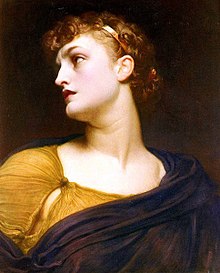
Antigone Page 2
We found 37 free papers on Antigone
Essay Examples
Overview
“King Oedipus” Is the Tragedy of Sophocles
Antigone
Oedipus
The story begins with a dialogue between King Oedipus and the priest. The latter reports that the people of Thebes are suffering from numerous disasters and seek help from Oedipus. The king tells how he sent to the Delphic oracle on the advice of Creon, but he was late and Oedipus is seized by anxious…
Gender Roles in “Antigone”
Antigone
Gender Issues
Gender Roles
Sophocles was Grecian dramatist who liked to argue that women were more capable and strong than the Greek society believed them to be. In ancient Greece, women had about as many rights as the slaves. For her entire life, a woman would live under the control of her father, husband, or other male relative. Women…
Kreon In Antigone
Antigone
In Antigone, both Antigone and Kreon could be considered the tragic heroes of the play. A tragic hero, defined by A Dictionary of Literary, Dramatic, and Cinematic Terms, is someone who suffers due to a tragic flaw, or hamartia. This Greek word is variously translated as “tragic flaw” or “error” or “weakness.” Kreon’s hamartia, like…
Antigone Argumentative
Antigone
Croon had a big ego, he believed that whatever he said went and that all should obey his saws, despite if they broke moral, religious, and all other beliefs. He proves this when he says, “Policies, I say, is to have no burial. NO man is to touch him or say the least of prayers,…
Compare “Antigone” with 21st Century life Sample
Antigone
Century
Life
The fifth century before the Common Era seems so long ago. yet the literature written in the clip period has stood the trial of clip. Sophocles’s play “Antigone” has many lessons that can be transverse applied to the present. Creon’s series of bloopers which finally lead to his autumn from power and felicity has a…
Sophocles’ Antigone and Chaucer’s The Wife of Bath’s Tale
Antigone
Sophocles
Tragedy
When comparing great works of literature one must look beyond theobvious and delve deeper into the meaning of such works. One must considerthe time period in which the literature was produced and the condition ofthat society. Themes are an important aspect of literary works because itputs the work into a clearer perspective helping the reader…
Enter Antigone and Ismene from the Palace
Antigone
ANTIGONE and Ismene from the palace. ANTIGONE: Ismene, my dear sister through common blood, do you know of any evil from Oedipus Zeus will not perform on us who still live? For I have seen nothing—nothing painful, nothing mad or shameful or dishonorable—(5) that is not among your or my sorrows. And now what do…
Antigone And Pilate Dead
Antigone
Sophocles’ Antigone and Toni Morrison’s Pilate Dead both exhibit similar qualities. These include an intense and almost peculiar sense of family, a general disregard for written law, and bravery in the face of death. However, comparing Antigone and Pilate requires recognizing the inner motivations that drive these women. Antigone’s fear stems from the power and…
Antigone by Sophocles
Antigone
The play “Antigone” by Sophocles depicts the tale of Antigone who defies the orders of King Creon and fulfills her wish of burying her brother’s body. King Creon argues that Antigone’s brother, Polynices displayed disobedient behavior by fighting against him in the Thebes’ civil war so he orders to leave his body on the…
Jean Anouilh Biography
Antigone
Mythology
Modern French dramatist, Jean Anouilh, is a great tragic playwright of the twentieth century. His best known work is Antigone, a modern version of Sophocles’ tragedy. Anouilh’s Antigone also provides a commentary on the Nazi occupation of France. In rewriting the myth in modern times, Anouilh revives the issue of free will under the power…
| genre | Tragedy |
|---|---|
| description | Antigone is a tragedy by Sophocles written in or before 441 BC. Of the three Theban plays Antigone is the third in order of the events depicted in the plays, but it is the first that was written. The play expands on the Theban legend that predates it, and it picks up where Aeschylus' Seven Against Thebes ends. |
| characters | Creon, Antigone, Ismene, Haemon, Eurydice of Thebes, Tiresias, Sentry, Polynices |
| information | Playwright: Sophocles Brother: Eteocles Chorus: Theban Elders Date premiered: c. 441 BCE Tragic flaws: Her tragic flaw is that she has hubris, which is excessive pride, and that leads her to be unbending. Ironically, Antigone means unbending in Greek. Because she is unbending, she will not denounce her decision to bury Polynices. This angers CreonCreonIn Oedipus Rex, Creon is a brother of queen Jocasta, the wife of King Laius as well as Oedipus. Laius, a previous king of Thebes, had given the rule to Creon while he went to consult the oracle at Delphi. Location: setting (place) Antigone and Oedipus the King are set in Thebes, Oedipus at Colonus in Colonus (near Athens)., Age: Thus Antigone should be thought of as a 15 year old at most, and possibly as much younger ( 12 or 13). Her behaviour – wild and defiant is not unheard of in girls of that age. In fact it was recognised as a problem in Athenian culture, to be managed by a strange custom., |

